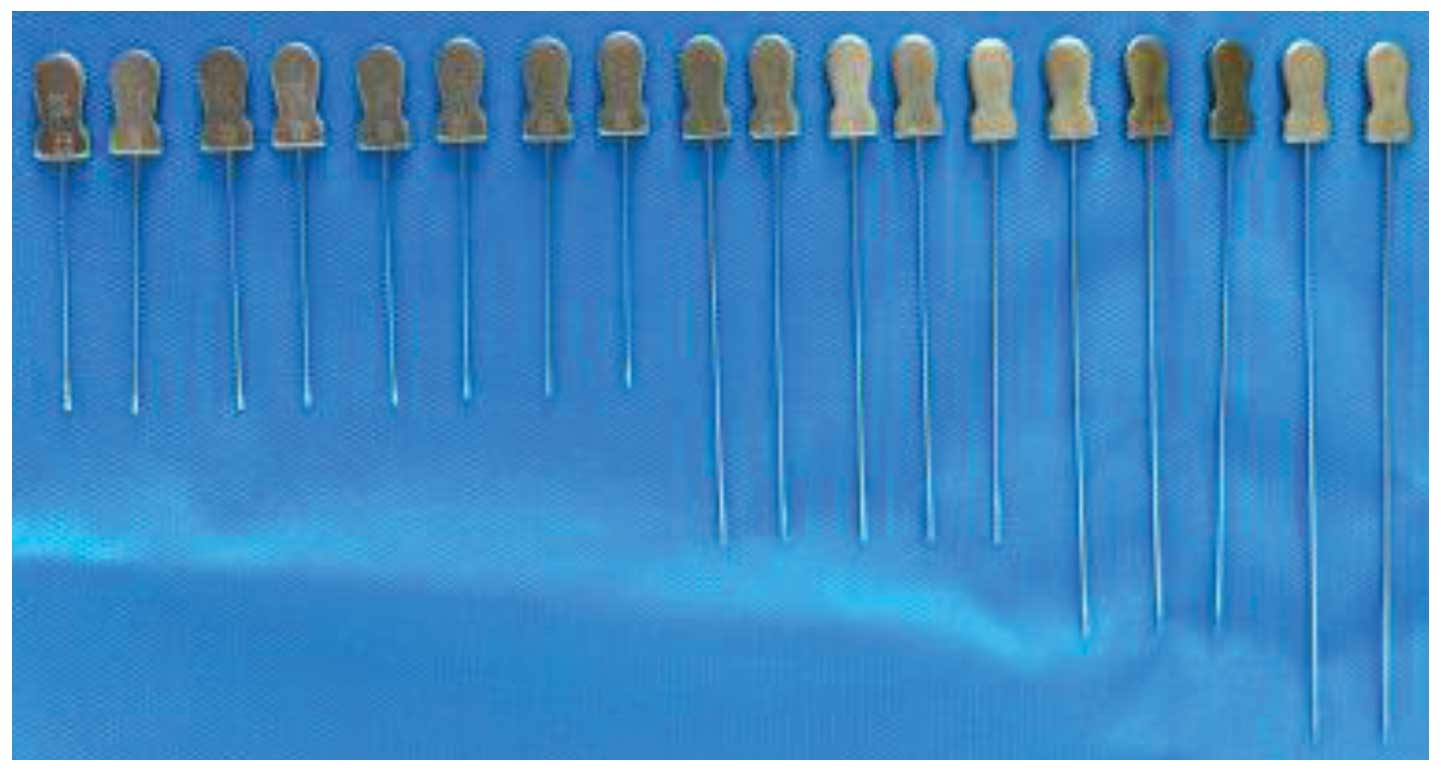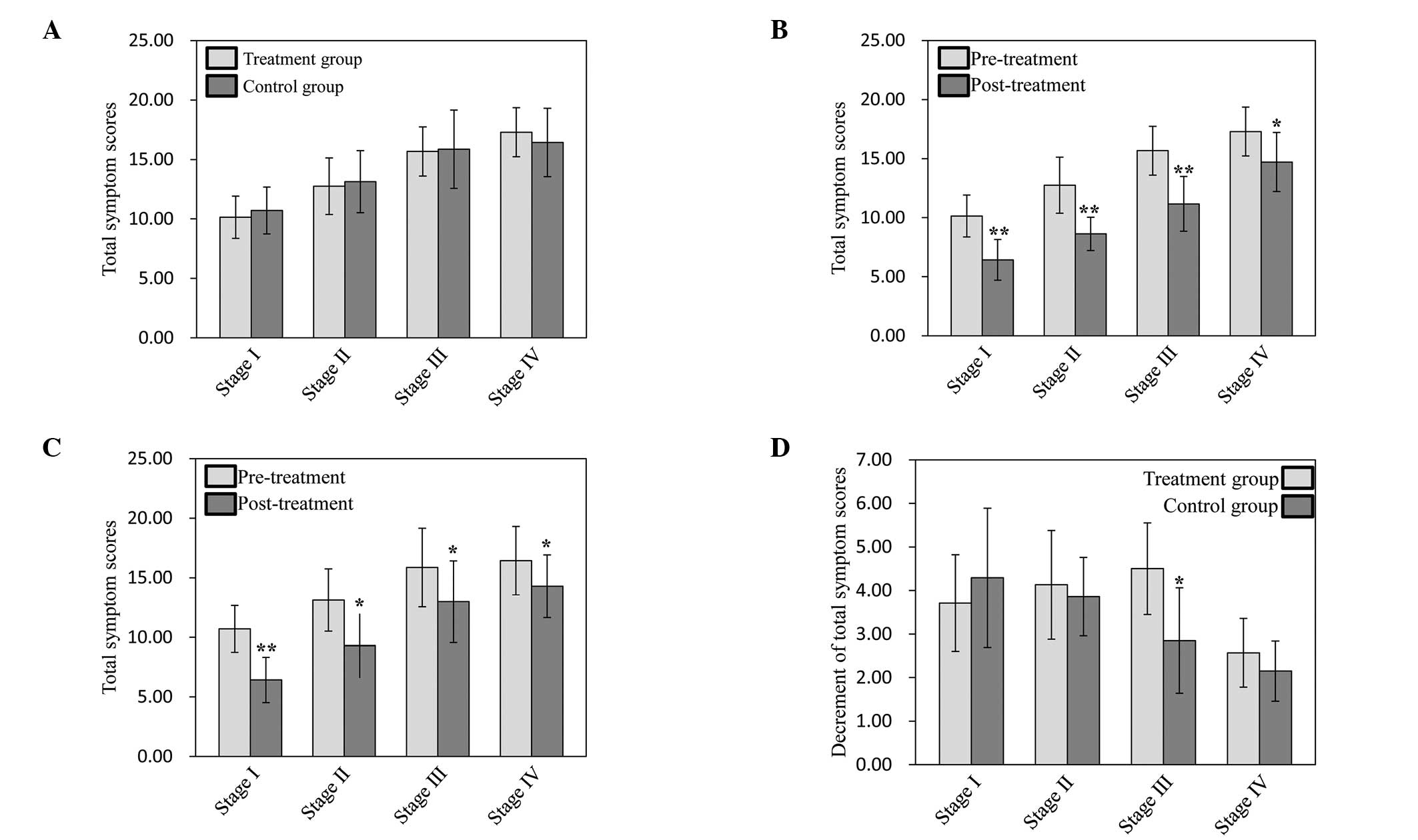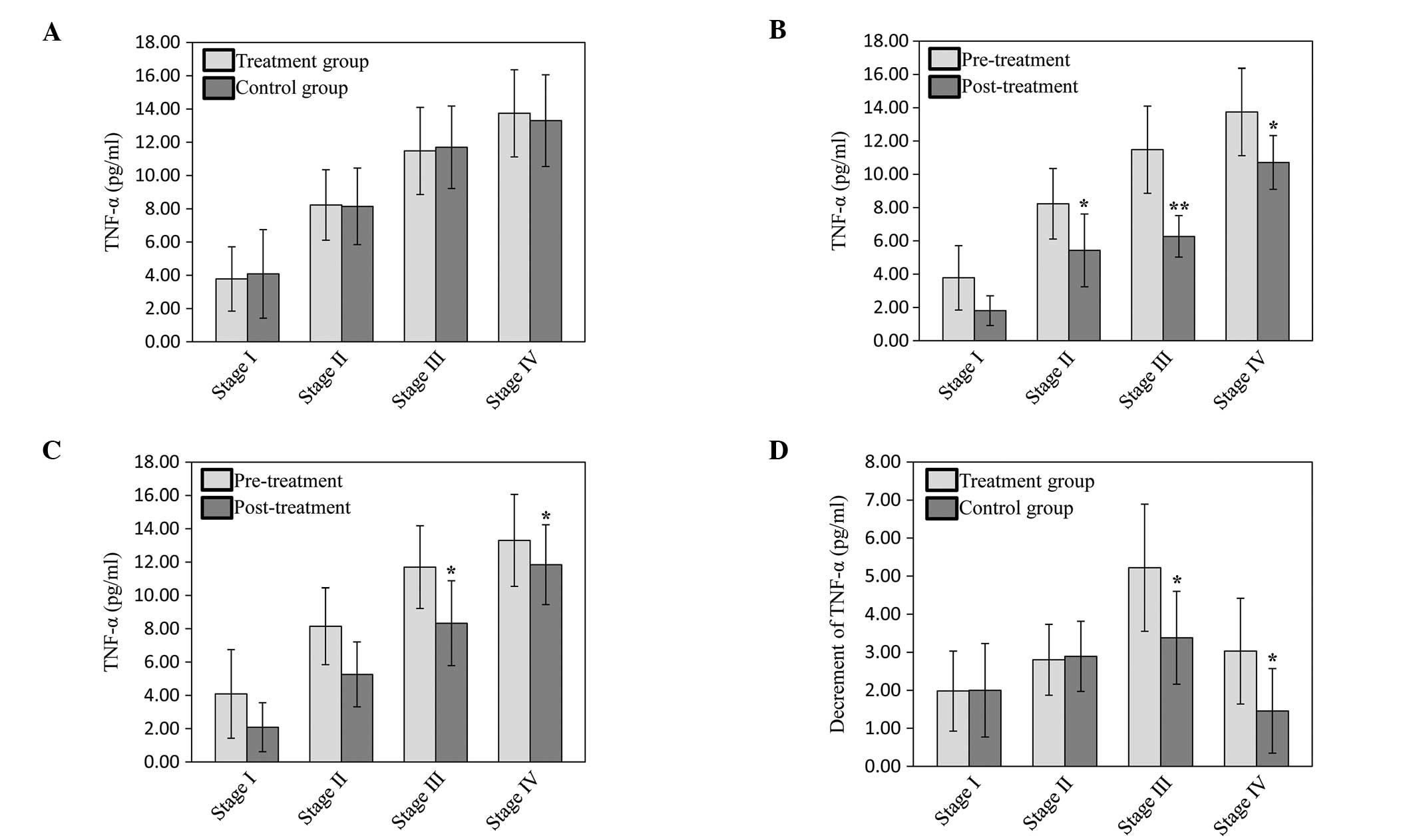|
1
|
Li XH, Peng J, Xu YF, et al:
Tetramethylpyrazine (TMP) promotes chondrocyte proliferation via
pushing the progression of cell cycle. J Med Plants Res.
5:3896–3903. 2011.
|
|
2
|
Li X, Lang W, Ye H, et al: Tougu Xiaotong
capsule inhibits the tidemark replication and cartilage degradation
of papain-induced osteoarthritis by the regulation of chondrocyte
autophagy. Int J Mol Med. 31:1349–1356. 2013.
|
|
3
|
Sarzi-Puttini P, Cimmino MA, Scarpa R, et
al: Osteoarthritis: an overview of the disease and its treatment
strategies. Semin Arthritis Rheum. 35(1 Suppl 1): 1–10. 2005.
View Article : Google Scholar
|
|
4
|
Felson DT, Lawrence RC, Dieppe PA, et al:
Osteoarthritis: new insights. Part 1: the disease and its risk
factors. Ann Intern Med. 133:635–646. 2000. View Article : Google Scholar : PubMed/NCBI
|
|
5
|
No authors listed. Recommendations for the
medical management of osteoarthritis of the hip and knee: 2000
update. American College of Rheumatology Subcommittee on
Osteoarthritis Guidelines. Arthritis Rheum. 43:1905–1915. 2000.
View Article : Google Scholar : PubMed/NCBI
|
|
6
|
Jordan KM, Arden NK, Doherty M, et al;
Standing Committee for International Clinical Studies Including
Therapeutic Trials ESCISIT. EULAR Recommendations 2003: an evidence
based approach to the management of knee osteoarthritis: Report of
a Task Force of the Standing Committee for International Clinical
Studies Including Therapeutic Trials (ESCISIT). Ann Rheum Dis.
62:1145–1155. 2003. View Article : Google Scholar
|
|
7
|
Hamburger MI, Lakhanpal S, Mooar PA and
Oster D: Intra-articular hyaluronans: a review of product-specific
safety profiles. Semin Arthritis Rheum. 32:296–309. 2003.
View Article : Google Scholar : PubMed/NCBI
|
|
8
|
Felson DT, Lawrence RC, Hochberg MC, et
al: Osteoarthritis: new insights. Part 2: treatment approaches. Ann
Intern Med. 133:726–737. 2000. View Article : Google Scholar : PubMed/NCBI
|
|
9
|
Blower AL, Brooks A, Fenn GC, et al:
Emergency admissions for upper gastrointestinal disease and their
relation to NSAID use. Aliment Pharmacol Ther. 11:283–291. 1997.
View Article : Google Scholar : PubMed/NCBI
|
|
10
|
McGettigan P and Henry D: Cardiovascular
risk and inhibition of cyclooxygenase: a systematic review of the
observational studies of selective and nonselective inhibitors of
cyclooxygenase 2. JAMA. 296:1633–1644. 2006. View Article : Google Scholar : PubMed/NCBI
|
|
11
|
Health Quality Ontario. Arthroscopic
lavage and debridement for osteoarthritis of the knee: an
evidence-based analysis. Ont Health Technol Assess Ser. 5:1–37.
2005.PubMed/NCBI
|
|
12
|
Fu MY and Zhang ZL: Knee osteoarthritis
treated with acupuncture at the points selected according to
syndrome differentiation: a randomized controlled trial. Zhongguo
Zhen Jiu. 31:1062–1066. 2011.(In Chinese).
|
|
13
|
Ahsin S, Saleem S, Bhatti AM, Iles RK and
Aslam M: Clinical and endocrinological changes after
electro-acupuncture treatment in patients with osteoarthritis of
the knee. Pain. 147:60–66. 2009. View Article : Google Scholar : PubMed/NCBI
|
|
14
|
Wu MX, Li XH, Lin MN, et al: Clinical
study on the treatment of knee osteoarthritis of Shen-Sui
insufficiency syndrome type by electroacupuncture. Chin J Integr
Med. 16:291–297. 2010. View Article : Google Scholar : PubMed/NCBI
|
|
15
|
Zeng GG, Zhang XF, Quan WC, et al: Effects
of needle knife relaxing therapy on tension of local soft tissue
and pain of osteoarthritis of knee. Zhongguo Zhen Jiu. 28:244–247.
2008.(In Chinese).
|
|
16
|
Lu D, Xu WX, Ding WG, Guo QF, Ma GP and
Zhu WM: Case-control study on needle-knife to cut off the medial
branch of the lumbar posterior ramus under C-arm guiding for the
treatment of low back pain caused by lumbar facet osteoarthritis.
Zhongguo Gu Shang. 26:214–217. 2013.(In Chinese).
|
|
17
|
Guo CQ, Ji B, Chen YN, et al: Affection of
acupotomy lysis on leu-enkephalin (L-ENK) content in different
parts of centrum of rats with knee osteoarthritis. Zhongguo Gu
Shang. 24:656–658. 2011.(In Chinese).
|
|
18
|
Hawker GA, Mian S, Bednis K and Stanaitis
I: Osteoarthritis year 2010 in review: non-pharmacologic therapy.
Osteoarthritis Cartilage. 19:366–374. 2011.PubMed/NCBI
|
|
19
|
Oliveria SA, Felson DT, Reed JI, Cirillo
PA and Walker AM: Incidence of symptomatic hand, hip, and knee
osteoarthritis among patients in a health maintenance organization.
Arthritis Rheum. 38:1134–1141. 1995. View Article : Google Scholar : PubMed/NCBI
|
|
20
|
Sharif M, George E and Dieppe PA:
Correlation between synovial fluid markers of cartilage and bone
turnover and scintigraphic scan abnormalities in osteoarthritis of
the knee. Arthritis Rheum. 38:78–81. 1995. View Article : Google Scholar : PubMed/NCBI
|
|
21
|
Li XH, Liang WN and Liu XX: Clinical
observation on curative effect of dissolving phlegm-stasis on 50
cases of knee osteoarthritis. J Tradit Chin Med. 30:108–112. 2010.
View Article : Google Scholar : PubMed/NCBI
|
|
22
|
Wang HM, Liu JN and Zhao Y: Progress on
integrated Chinese and Western medicine in the treatment of
osteoarthritis. Chin J Integr Med. 16:378–384. 2010. View Article : Google Scholar : PubMed/NCBI
|
|
23
|
Mao JJ and Kapur R: Acupuncture in primary
care. Prim Care. 37:105–117. 2010. View Article : Google Scholar
|
|
24
|
Li HY, Cui L, Cui M and Tong YY: Active
research fields of acupuncture research: a document co-citation
clustering analysis of acupuncture literature. Altern Ther Health
Med. 16:38–45. 2010.PubMed/NCBI
|
|
25
|
Lechner M, Steirer I, Brinkhaus B, et al:
Efficacy of individualized Chinese herbal medication in
osteoarthrosis of hip and knee: a double-blind,
randomized-controlled clinical study. J Altern Complement Med.
17:539–547. 2011. View Article : Google Scholar : PubMed/NCBI
|
|
26
|
Tan C, Wang J, Feng W, Ding W and Wang M:
Preliminary correlation between warm needling treatment for knee
osteoarthritis of deficiency-cold syndrome and metabolic functional
genes and pathways. J Acupunct Meridian Stud. 3:173–180. 2010.
View Article : Google Scholar : PubMed/NCBI
|
|
27
|
Li XH, Wu MX, Ye HZ, et al: Experimental
study on the suppression of sodium nitroprussiate-induced
chondrocyte apoptosis by Tougu Xiaotong Capsule-containing serum.
Chin J Integr Med. 17:436–443. 2011. View Article : Google Scholar
|
|
28
|
Goldring MB and Goldring SR:
Osteoarthritis. J Cell Physiol. 213:626–634. 2007. View Article : Google Scholar : PubMed/NCBI
|
|
29
|
Yuan PW, Liu DY, Chu XD, Hao YQ, Zhu C and
Qu Q: Effects of preventive administration of juanbi capsules on
TNF-alpha, IL-1 and IL-6 contents of joint fluid in the rabbit with
knee osteoarthritis. J Tradit Chin Med. 30:254–258. 2010.
View Article : Google Scholar : PubMed/NCBI
|
|
30
|
Goldring MB and Berenbaum F: The
regulation of chondrocyte function by proinflammatory mediators:
prostaglandins and nitric oxide. Clin Orthop Relat Res. 427(Suppl):
S37–S46. 2004. View Article : Google Scholar : PubMed/NCBI
|
|
31
|
Smith RL, Allison AC and Schurman DJ:
Induction of articular cartilage degradation by recombinant
interleukin 1 alpha and 1 beta. Connect Tissue Res. 18:307–316.
1989. View Article : Google Scholar : PubMed/NCBI
|
|
32
|
Fernandes JC, Martel-Pelletier J and
Pelletier JP: The role of cytokines in osteoarthritis
pathophysiology. Biorheology. 39:237–246. 2002.PubMed/NCBI
|
|
33
|
Stöve J, Huch K, Günther KP and Scharf HP:
Interleukin-1beta induces different gene expression of stromelysin,
aggrecan and tumor-necrosis-factor-stimulated gene 6 in human
osteoarthritic chondrocytes in vitro. Pathobiology. 68:144–149.
2000.PubMed/NCBI
|
|
34
|
Porée B, Kypriotou M, Chadjichristos C, et
al: Interleukin-6 (IL-6) and/or soluble IL-6 receptor
down-regulation of human type II collagen gene expression in
articular chondrocytes requires a decrease of Sp1. Sp3 ratio and of
the binding activity of both factors to the COL2A1 promoter. J Biol
Chem. 283:4850–4865. 2008.
|
|
35
|
Saklatvala J: Tumour necrosis factor alpha
stimulates resorption and inhibits synthesis of proteoglycan in
cartilage. Nature. 322:547–549. 1986. View
Article : Google Scholar : PubMed/NCBI
|
|
36
|
Goldring MB, Fukuo K, Birkhead JR, Dudek E
and Sandell LJ: Transcriptional suppression by interleukin-1 and
interferon-gamma of type II collagen gene expression in human
chondrocytes. J Cell Biochem. 54:85–99. 1994. View Article : Google Scholar : PubMed/NCBI
|



















